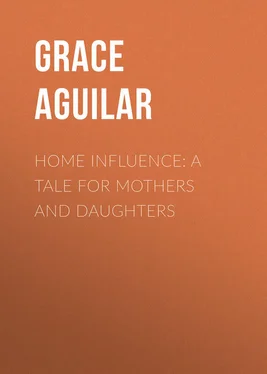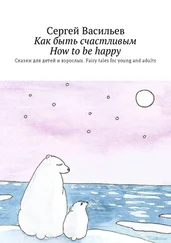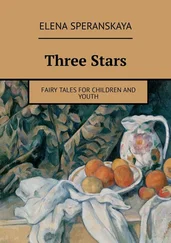Grace Aguilar - Home Influence - A Tale for Mothers and Daughters
Здесь есть возможность читать онлайн «Grace Aguilar - Home Influence - A Tale for Mothers and Daughters» — ознакомительный отрывок электронной книги совершенно бесплатно, а после прочтения отрывка купить полную версию. В некоторых случаях можно слушать аудио, скачать через торрент в формате fb2 и присутствует краткое содержание. Жанр: foreign_antique, foreign_prose, на английском языке. Описание произведения, (предисловие) а так же отзывы посетителей доступны на портале библиотеки ЛибКат.
- Название:Home Influence: A Tale for Mothers and Daughters
- Автор:
- Жанр:
- Год:неизвестен
- ISBN:нет данных
- Рейтинг книги:4 / 5. Голосов: 1
-
Избранное:Добавить в избранное
- Отзывы:
-
Ваша оценка:
- 80
- 1
- 2
- 3
- 4
- 5
Home Influence: A Tale for Mothers and Daughters: краткое содержание, описание и аннотация
Предлагаем к чтению аннотацию, описание, краткое содержание или предисловие (зависит от того, что написал сам автор книги «Home Influence: A Tale for Mothers and Daughters»). Если вы не нашли необходимую информацию о книге — напишите в комментариях, мы постараемся отыскать её.
Home Influence: A Tale for Mothers and Daughters — читать онлайн ознакомительный отрывок
Ниже представлен текст книги, разбитый по страницам. Система сохранения места последней прочитанной страницы, позволяет с удобством читать онлайн бесплатно книгу «Home Influence: A Tale for Mothers and Daughters», без необходимости каждый раз заново искать на чём Вы остановились. Поставьте закладку, и сможете в любой момент перейти на страницу, на которой закончили чтение.
Интервал:
Закладка:
"And will she never, never speak to me again? will she never kiss me – never call me her own darling, beautiful Edward again?" he almost screamed in passionate grief, as the truth at length forced itself upon him. "Mamma, mamma, my own dear, pretty, good mamma, oh! do not go away from me – or let me go with you – let me die too; no one will love me and kiss me as you have done." And even the natural awe and terror of death gave way before his grief; he clung to the body of his mother so passionately, so convulsively, that it required actual force to remove him. And for hours his aunt and sister watched over and tried to soothe and comfort him in vain; he would only rouse himself angrily to ask Ellen how she could know what he felt; she had never loved their mother as he had – she did not know what he had lost – she could not feel as he did, and then relapse into tears and sobs. Ellen did not attempt reply. She thought, if it were such pain to her to lose her mother, who had only the last few weeks evinced affection for her, it must indeed be still more suffering to him; and though his angry words grieved and hurt her (for she knew she did love her mother most fondly, her idea of her own extreme inferiority acquitted her unconsciously of all injustice toward her, and made her believe that she had loved Edward best only because he was so much better than herself), his very grief caused her to love and admire him still more, and to believe that she really did not feel as much as he did. And yet before they quitted Llangwillan, which they did the second day after Mrs. Fortescue's funeral, Edward could laugh and talk as usual – except when any object recalled his mother; and poor Ellen felt that though she had fancied she was not happy before, she was much more unhappy now. Her fancy naturally vivid, and rendered more so from her having been left so much to herself, dwelt morbidly on all that had passed in her mother's illness, on every caress, every unusual word of affection, and on Mr. Myrvin's assurance that she would love her in Heaven; the promise she had made to love and help Edward returned to her memory again and again, and each time with the increased determination to keep it solemnly. It was not for her mother's sake alone, and connected only with her; perhaps, had it not been for the careful instructions of her father, whom, as we shall presently see, she had cause almost to idolize, Ellen might have become indifferent to her mother and envious of Edward. But his repeated instructions, under all circumstances to love, cherish, and obey her mother had been indelibly engraved, and heightened natural feeling. She believed that to keep the promise, which had so evidently pleased her mother, would be also obeying her father, and this double incentive gave it a weight and consequence, which, could Mrs. Hamilton have known it, would have caused her great anxiety, and urged its removal. But Ellen had been too long accustomed to hide every thought and feeling to betray that which, child as she was, she believed sacred between herself and her mother. Mrs. Hamilton watched her in silence, and trusted to time and care to do their work; and by enabling her to understand her character, permit her to guide it rightly.
The morning of their intended departure was bright and sunny, and before even widow Morgan was moving, Ellen had quitted her little bed and was in the churchyard by her mother's grave. She sat there thinking so intently, that she did not know how time passed, till she was roused by her favorite Arthur Myrvin's voice.
"Up so early, Ellen, why, I thought I should have been first, to show you I had not forgotten my promise." And he displayed some choice flower-roots, which he commenced planting round the grave.
"Dear Arthur, how very kind you are; but you look so sad – what is the matter? Does not Mr. Myrvin like you to do this – pray don't, then."
"No, no, Ellen, my father said I was right, and that he would take care of the flowers also himself. I am only sorry you are going away, and to live so differently to what we do – you will quite forget me."
"Indeed, indeed I shall not, dear Arthur; I can never forget those who have been so kind to me as you and dear Mr. Myrvin. I would much rather stay here always with you, than go among strangers again, but I heard my aunt say last night, that perhaps Mr. Myrvin would let you come and see us sometimes – and you will like that, will you not?" Arthur did not seem quite sure whether he would like it or not; but they continued talking till his task was completed, and Arthur, at Ellen's earnest request, for she suddenly feared her aunt would be displeased at her having staid out so long, returned with her to the cottage; the silent kiss, however, which she received, when Arthur explained what had detained them, reassured her, and bound her yet closer to the kind relative, whom, if timidity had permitted, she would already have so loved.
The novelty of his situation, the rapid and pleasant movement of his uncle's carriage, the idea of the new relations he was about to meet, and an unconfessed but powerful feeling of his own increased consequence in being so nearly connected with wealth and distinction, all had their effect upon Edward, and his eye sparkled and his cheek glowed, as if all sorrow had entirely passed away; not that he had ceased to think of his mother, for the least reference to her would fill his eyes with tears and completely check his joy – but still delight predominated. Ellen felt more and more the wish to shrink into her self, for the farther they left Llangwillan, the more painfully she missed Mr. Myrvin and his son, and the more she shrunk from encountering strangers. Edward she knew would speedily find companions to love, and to be loved by, and he would think still less of her. Her aunt would soon be surrounded by her own children, and then how could she expect to win her love? And Ellen looked intently and silently out from the carriage-window – her uncle believed on the many-flowered hedge and other objects of interest by which they passed – his wife imagined to hide a tear that trembled in her eyes, but which she had determined should not fall.
CHAPTER III.
RETROSPECTION. – THE LOWLY SOUGHT. – THE HAUGHTY FOILED
In order clearly to understand the allusions of the previous chapters, and the circumstances which had formed the different characters of Mrs. Hamilton and Mrs. Fortescue, it will be necessary to take a retrospective glance on their early lives. Should it be uninteresting to the more youthful of our readers, we will beg them to proceed at once to "Traits of Character," but to their elder relatives, we hope the matter will prove of sufficient interest to obtain perusal.
Emmeline and Eleanor Manvers were the daughters of Lord Delmont, a nobleman whose title and rank were rather burdensome than otherwise, from the want of sufficient means to keep them up as inclination and position warranted. Lady Delmont, whose energetic yet gentle character would have greatly ameliorated the petty vexations of her husband, died when Emmeline was only seven, Eleanor five, and Charles, her only boy an infant of but three years old. A widow lady, Mrs. Harcourt by name, had been selected by Lady Delmont, in her last illness, as instructress and guardian of her daughters. Her wishes, always laws to her doating husband, were promptly fulfilled, and Mrs. Harcourt, two months after her friend's death, assumed the arduous and responsible duties for which her high character well fitted her.
With Emmeline, though there were naturally some faults to correct, an indolence and weakness to overcome, and apparently no remarkable natural aptitude for acquirement, her task was comparatively easy, for her pupil had the capabilities, not only of affection but of reverence, to a very great extent, and once loving and respecting Mrs. Harcourt, not a command was neglected nor a wish unfulfilled. Eleanor, on the contrary, though so gifted that teaching might have been a complete labor of love – by self-will, violent passions, and a most determined want of veneration, even, of common respect, a resolute opposition from her earliest years to the wishes of Mrs. Harcourt, because she was merely a governess, so much her inferior in rank, rendered the task of education one of the most difficult and painful that can be conceived – increased from the injudicious partiality of Lord Delmont. It was not indeed the culpable negligence and dislike which Eleanor afterward displayed toward her own, but originating in the fancy that Mrs. Harcourt was unjust, and Emmeline was her favorite. Lord Delmont was one of those unfortunately weak, irresolute characters, that only behold the surface of things, and are therefore utterly incapable of acting either with vigor or judgment. When he did venture into the precincts of his daughters' apartments, he generally found Eleanor in sobs and tears, and Emmeline quietly pursuing her daily duties. That Mrs. Harcourt often entreated his influence with her younger pupil, to change her course of conduct, he never remembered longer than the time her expostulations lasted. Once or twice indeed he did begin to speak seriously, but Eleanor would throw her arms round his neck and kiss him, call him every endearing name, and beg him not to look so much like grave, cross Mrs. Harcourt, or she should think she had indeed no one to love her; and her beautiful eyes would swell with tears, and her voice quiver, so that her gratified father would forget all his reproof, and give her some indulgence to make up for the injustice and harshness she encountered in the school-room. Her power once thus experienced, of course, was never resigned. Her father's appearance in their study was always the signal for her tears, which she knew would confirm all his ideas of Mrs. Harcourt's unjust partiality.
Читать дальшеИнтервал:
Закладка:
Похожие книги на «Home Influence: A Tale for Mothers and Daughters»
Представляем Вашему вниманию похожие книги на «Home Influence: A Tale for Mothers and Daughters» списком для выбора. Мы отобрали схожую по названию и смыслу литературу в надежде предоставить читателям больше вариантов отыскать новые, интересные, ещё непрочитанные произведения.
Обсуждение, отзывы о книге «Home Influence: A Tale for Mothers and Daughters» и просто собственные мнения читателей. Оставьте ваши комментарии, напишите, что Вы думаете о произведении, его смысле или главных героях. Укажите что конкретно понравилось, а что нет, и почему Вы так считаете.












